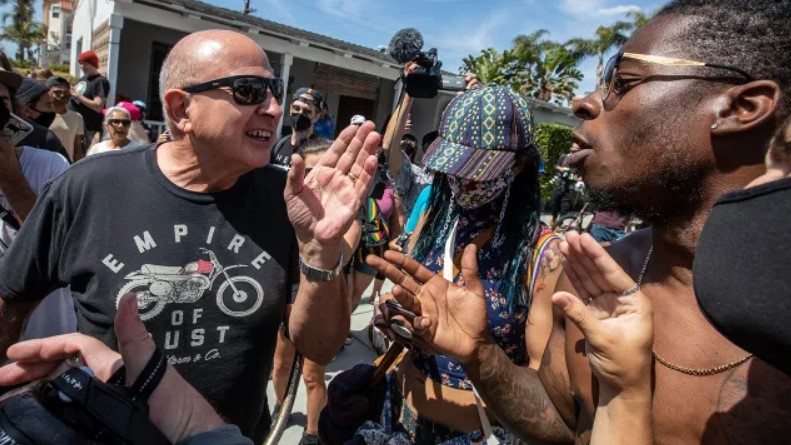Lessons From Zero Day: Bridging the Divide in a Polarized Society

By: John Waller – Rotarian Peacebuilder and Member, Rotary Action Group for Peace
I am a cybersecurity professional and was asked by my company to watch the new Netflix political thriller, Zero Day starring Robert De Niro, and offer my take from a technical perspective. Ironically, I was en route to Rotary International’s Peace Conference: Healing a Divided World when the series premiered, and I was able to watch all six episodes while traveling to Istanbul, where the conference was being held. What struck me most wasn’t just the depiction of a catastrophic cyberattack – it was the profound exploration of how deeply fractured our society has become. While Zero Day’s action revolves around a cyberattack, the deeper, more unsettling conflict is how easily fear and misinformation turn people against each other, and how this societal divide is perhaps the greatest vulnerability of all.
A Nation on Edge
In Zero Day, the chaos of a massive cyberattack isn’t just about the disruption of infrastructure – it’s about the fragmentation of society. Fear, distrust, and misinformation spread as quickly as the digital attack itself, turning citizens against one another and deepening existing divides. Government leaders clash over how to respond, the public struggles to separate truth from manipulation, and in the aftermath, it becomes clear that the real threat isn’t just the cyberattack – it’s how easily society can be turned against itself.
This isn’t just a fictional scenario; it’s a reflection of the world we live in today. Political and ideological polarization has reached levels that threaten not only civil discourse but also national stability. Misinformation spreads more rapidly than truth, amplifying division and deepening distrust. According to a study by MIT, false information is 70% more likely to be shared, spreads six times faster, and is 20 times more likely to be shared by multiple accounts than factual news. When a society is this divided, it becomes more vulnerable – not just to cyberattacks, but to misinformation, foreign influence, and internal strife. If Zero Day serves as a wake-up call for anything beyond cybersecurity, it’s this: How do we heal the fractures that make us susceptible to division in the first place?
The Weaponization of Division
Polarization is no longer just a social or political issue – it’s a strategic vulnerability. Nation-states and cybercriminal organizations exploit ideological divides to spread misinformation, weaken trust in institutions, and destabilize democracies from within. A divided society is easier to manipulate, easier to control, and ultimately, easier to break. We’ve already seen this play out in real life – foreign influence in elections, disinformation campaigns designed to erode trust in democratic institutions, and algorithm-driven echo chambers reinforcing extreme viewpoints.
The challenge is that polarization doesn’t happen overnight. It builds slowly, reinforced by social media algorithms, partisan news cycles, and a growing reluctance to engage with differing perspectives. Over time, dialogue is replaced with outrage, compromise with absolutism, and nuance with tribal loyalty. When society reaches this point, even objective facts become politicized, making it nearly impossible to unify around common challenges – including cybersecurity, national defense, and the stability of democratic institutions. If we cannot find ways to bridge these divides, we risk becoming our own greatest threat.
Rebuilding Trust and Common Ground
Healing a divided society isn’t about forcing agreement – it’s about rebuilding trust, fostering dialogue, and restoring a shared sense of purpose. This starts with reaffirming truth and accountability. Misinformation thrives in environments where facts are malleable and distrust is high. Strengthening media literacy, holding platforms accountable for amplifying falsehoods, and prioritizing transparency from both governments and businesses are essential steps in rebuilding credibility.
But trust isn’t just about institutions – it’s about people. Engaging in meaningful conversations with those who hold different viewpoints, resisting the urge to dehumanize ideological opponents, and fostering spaces for civil discourse can help reduce the knee-jerk hostility that fuels division. Community organizations, businesses, and educational institutions all have roles to play in creating environments where disagreement doesn’t mean destruction.
Technology can be part of the solution rather than the problem. Just as cyber threats have evolved, so too must the way we engage with information online. AI-driven misinformation detection, transparency in content moderation, and digital literacy initiatives can help users navigate an increasingly complex information landscape. Rather than allowing social media to continue as an amplifier of division, platforms and policymakers must prioritize reducing algorithmic bias and reinforcing shared civic values rather than just engagement metrics.
A Call to Collective Action
In Zero Day, the real danger isn’t just the cyberattack itself – it’s the way fear and division prevent a unified response. This is a stark reminder that societal stability isn’t just about defense mechanisms and firewalls; it’s about whether people trust each other enough to stand together when it matters most. Bridging the divide won’t happen overnight, but it starts with a commitment to listening, engaging, and refusing to let division be weaponized against us. Governments must uphold transparency and protect democratic processes. Businesses must take responsibility for how technology influences social cohesion. Individuals must make an effort to seek truth beyond partisan narratives.
After the conference’s first day’s general and specific sessions, all of which touched in one way or another on creating solutions and bridging divides, it became clear that community-based organizations like Rotary and committed individuals must take the lead in this movement. By actively encouraging dialogue and combating radicalized hate speech and disinformation, these organizations can help rebuild the trust that is essential for a resilient society. The strength of a nation isn’t measured only by its military or cybersecurity defenses – it’s measured by its ability to remain unified in the face of crisis. The question Zero Day asks isn’t just whether we can prevent cyberattacks; it’s whether we can prevent ourselves from becoming so divided that we fail to defend what matters most.









